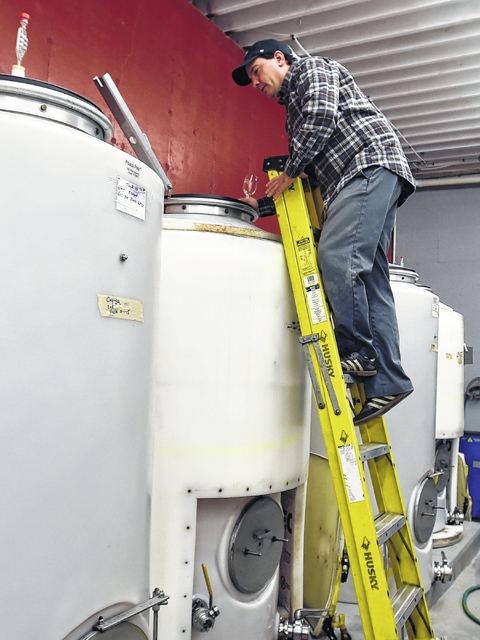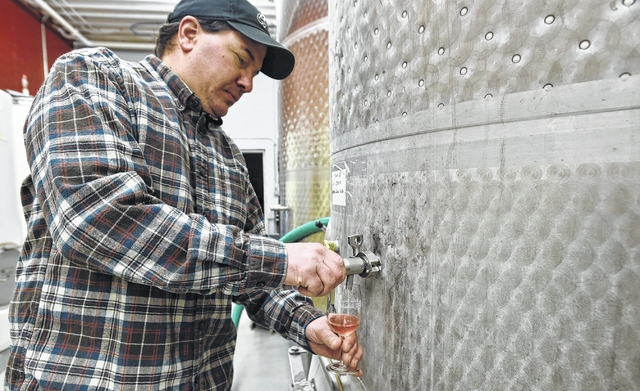SCOTT TWP. — Making wine is in Sal Maiolatesi’s blood. His great grandfather immigrated to the United States in the early 1900s and not only made wine but also worked as a blacksmith who made wine presses and crushers. Three generations later, Maiolatesi has found an immense passion for the fermenting process of his ancestors and carries on that tradition with a penchant for paying homage to quality Pennsylvania fruit.
Maiolatesi opened his first winery in 1998 at the age of 28. He now has 17 wine-making seasons under his belt. His Maiolatesi Winery in Scott Twp. sits on a picturesque mountainside where he also lives, and he has retail stores in Mayfield, Honesdale and West Pittston but his journey toward introducing Northeastern Pennsylvanians to wine from their home region has been an arduous one, although one of love.
Winemaking, Maiolatesi said, skipped a generation between his grandfather and father because grapes became too expensive to continue the yearly process, but Maiolatesi’s father wanted to learn the art of turning fruit to fine alcohol when Sal was 20 years old, and the pair began honing the skill with the help of a friend who was a home winemaker.
“From there, it really snowballed,” Maiolatesi said. “I fell in love with the whole concept of people telling you they like your wine.”
Maiolatesi’s first winery, built in his then Carbondale home, became his breeding ground for making in-state wine. He even had a retail store in a shopping center in Childs and was successful enough to expand his operation to the basement of that shopping center in 2002. In 2007, however, tragedy struck and Maiolatesi’s facility in Childs caught fire.
With the help of a network of friends, growers and vintners, he recovered, making wine in the facilities of several colleagues just to get a yield and never failing his contracts to purchase from vineyards. In the meantime, construction began on the facility that now stands on his property in Scott Twp.
“We met a lot of people in all those years throughout the Pennsylvania wine industry, and some of them were very, very good to us when we had our fire,” Maiolatesi said. “One winery sent us a $1,000 check in the mail.”
With his new facility built, Maiolatesi returned to his mission of making Pennsylvania wine.
According to the Alcohol Tobacco Tax and Trade Bureau, to be labeled a Pennsylvania wine, 75 percent of the fruit used must be grown in the commonwealth while 25 percent can come from another state within a 350 mile radius of the winery in question.
Maiolatesi said a federal supreme court decision from 2005 affected shipping laws and made the bureau’s laws unenforceable, because wineries in different locations have access to different out-of-state growers.
“It said that Pennsylvania (could allow) their wineries in state to ship to direct consumers but would not allow an out-of-state winery to ship to Pennsylvania consumers, basically breaking the 21st Amendment, the Commerce Clause,” Maiolatesi said. “It was giving in-state businesses preference over out-of-state businesses.”
The vintner noted he cannot currently make all of his varieties with 75 percent Pennsylvania fruit due to lack of availability of certain grapes, but hopes that will change as shipping laws evolve.
“We pride ourselves in saying that we are a Pennsylvania winery and we use as much Pennsylvania fruit as we can, and we definitely fall into the category of a true Pennsylvania winery,” Maiolatesi said.
In the meantime, Maiolatesi is focused on showing consumers how good Pennsylvania wine can be. The region, he explained, is often touted for its white grapes, but he said good vinifera reds such as cabernet and merlot grapes can be grown.
“There is a big misconception that we can’t produce good bottles using Pennsylvania fruit, that you can’t get a good quality cabernet,” Maiolatesi said. “You can.”
“We have a challenging climate, hence why, at our location in Scott Twp., I don’t grow any fruit,” Maiolatesi continued. “In Northeastern Pennsylvania, the reds are the most difficult because they need the longest growing season in order to ripen properly. Where we do have that is in Southeast Pa. In Southeastern Pennsylvania, we can grow great merlot; we can grow great cabernet franc; we can grow, in an ideal year, wonderful cabernet sauvignon.”
Courtney Melvin works at Maiolatesi’s retail store in West Pittston and said the holiday season was good for business.
“It was really good last week,” Melvin said on Dec. 30. “We’re out of a lot of wine.”
Bernie and Donna Vodzack, of Pittston, have been shopping at the West Pittston store since the summer and said they’d been in the store three times over the holiday season.
“(We come in) for the reds, the Coal Miner’s Red and also the pinot noir and the cab franc,” Bernie said.
“For the holidays, it’s the best, because they have so many pretty things and the prices are great,” Donna added.
Maiolatesi said one of the biggest challenges is getting people who know wine to try true Pennsylvania wine, but he is optimistic about the future.
“When we get them in the tasting room, they’re very surprised, especially when they taste the vinifera reds,” he said.








